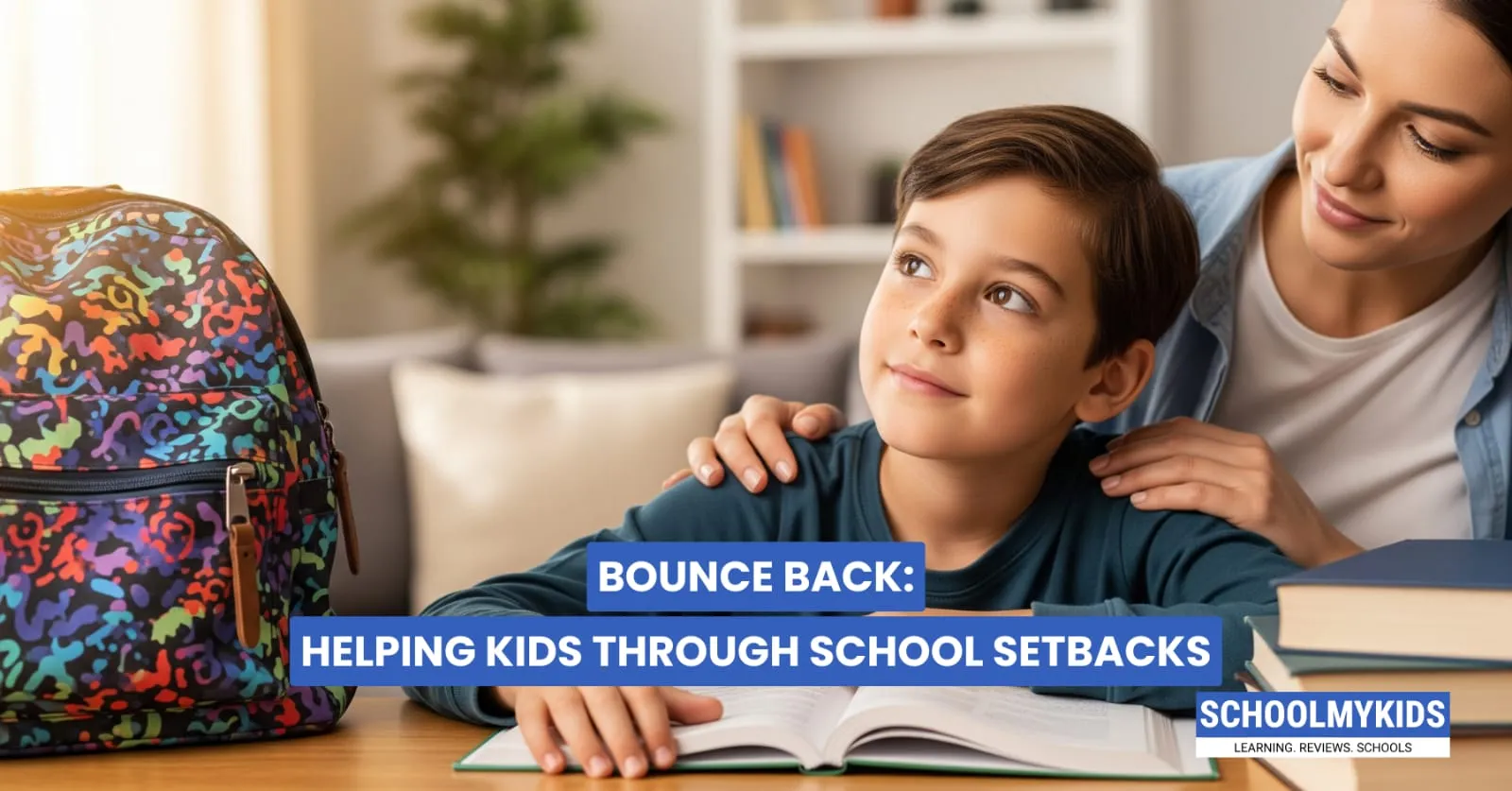Every parent dreams of seeing their child shine in school with good grades, happy friendships, and confident performances. But the truth is, every child, at some point, faces setbacks. Maybe it’s a failed test, a lost competition, a friendship that breaks down, or even bigger challenges like bullying or anxiety. As parents, watching your child struggle is painful. But here’s something important to remember: a setback is not the end of their story. It’s a part of their journey.
The way parents respond during these moments often either crushes a child’s confidence or helps it grow. Children don’t always bounce back on their own. They need guidance, empathy, and support to find strength when they feel they’ve fallen short.
Academic Setbacks: The Missed Marks and Failed Tests
One of the most common setbacks kids face is academic (poor grades, a failed test, or not getting into a program or subject they hoped for).
Why it hits hard: In today’s competitive environment, grades often feel like the measure of a child’s worth. Social media and peer comparisons make it even tougher; kids easily believe they’re “not smart enough.”
How parents can help:
- Instead of scolding, sit down and talk about what went wrong; was it study habits, test anxiety, or unclear concepts?
- Normalize failure; share stories of your own setbacks and how you overcame them.
- Offer practical support: help make a study plan, hire a tutor, or guide them in time management.
- Focus on growth and praise effort over outcome. A child who keeps improving will eventually succeed.
Social Setbacks: Friendships, Fights, and Feeling Left Out
Friendships are the heartbeat of school life. When kids face rejection, bullying, exclusion, or friendship changes, it can feel like their world is collapsing.
Why it hits hard: Children measure their sense of belonging heavily through peers. Being “the odd one out” can hurt more than a bad grade.
How parents can help:
- Listen without judgment. Don’t dismiss their pain with, “It’s just school drama.” To them, it’s very real.
- Teach conflict resolution: role-play how to handle arguments calmly and respectfully.
- Encourage healthy friendships outside of school, too. Sports, hobby classes, or cousins can give children a sense of belonging.
- Keep an eye out for patterns of bullying and take it seriously, and intervene by working with teachers instead of telling your child to just “ignore it.”
Extracurricular Setbacks: Not Making the Team, Stage Fear, or Losing Competitions
Whether it’s missing the cut for the school team, forgetting lines in a play, or losing a debate, extracurricular setbacks can sting. These activities are where kids put their passions and personality on display, and failure feels personal.
Why it hits hard: Kids see extracurricular wins as proof of talent and individuality. Failure can make them doubt their potential.
How parents can help:
- Remind them that effort builds skill, and talent grows with practice.
- Help them reframe the experience: “What did you learn this time that will help you next time?”
- Celebrate participation itself. Showing up, trying, and putting yourself out there takes courage.
- Encourage them to try again or explore new interests. One rejection shouldn’t make them give up on passions entirely.
Mental Health Setbacks: Anxiety, Burnout, and Self-Doubt
School pressure today is unlike any other time. From early ages, kids are juggling exams, projects, competitions, and the constant comparison fed by social media. Many children struggle with anxiety, stress, or low self-esteem.
Why it hits hard: Unlike visible failures, these struggles are internal and harder to explain. Kids often feel misunderstood because parents can’t “see” the problem.
How parents can help:
- Create a safe space at home where kids can talk about emotions without fear of judgment.
- Watch for signs like irritability, withdrawal, difficulty sleeping, or sudden loss of interest in things they once enjoyed.
- Reduce pressure; don’t pile expectations endlessly, even if “other kids” seem to be excelling.
- Don’t hesitate to seek professional help as counselors and therapists can make a real difference.
Comparison Setbacks: Living in Someone Else’s Shadow
Perhaps one of the hardest blows children face is being compared. Whether it’s to siblings, classmates, or even top students in school, such comparisons can hurt deeply.
Why it hits hard: Kids begin to believe they’ll never be good enough, no matter what they do.
How parents can help:
- Avoid comparisons altogether as they only breed resentment and insecurity.
- Acknowledge their unique strengths, even if they don’t fit the “traditional” mold.
- Celebrate the small wins as they need to know their progress matters.
Helping Your Child Bounce Back: The Parent’s Role
When kids face setbacks, it’s tempting for parents to either “fix it” or minimize it. But the real support lies in walking beside them. Here’s how to truly help:
- Empathize first: Say things like, “I know this hurts,” instead of rushing to advice.
- Teach resilience: Small steps like trying again, making a new plan, or learning from mistakes, help build mental toughness.
- Balance encouragement with reality: Don’t promise, “You’ll always win next time.” Instead, say, “Even if it takes time, I’ll be here with you.”
- Model resilience yourself: Let them see how you handle challenges in life.
Conclusion
Setbacks in school feel huge in the moment, but they don’t define a child’s future. What defines them is how they rise after falling. With patient, understanding, and supportive parenting, children learn that one failure isn’t fatal; it’s a stepping stone.
Your child doesn’t need you to solve every problem. They need you to stand beside them, believe in them, and remind them that no matter what happens in school, they can always bounce back.









Be the first one to comment on this story.